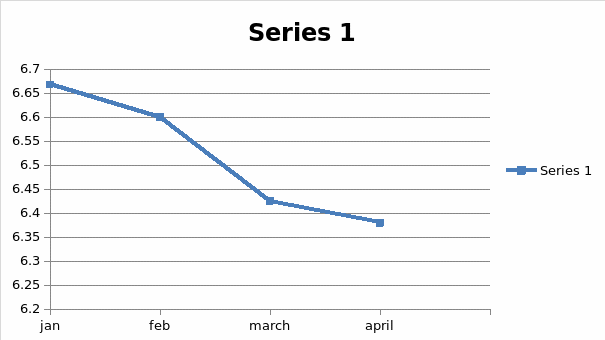Latest news report that the Chinese Yuan was exchanged for the American dollar as bellow: one US dollar is equivalent to 6.28921 Chinese Yuan. Chinese Yuan was equivalent to 0.159002 American dollars. The graph below is a part- January to April- of the exchange rate table and how it has moved for the past one fiscal year (Yahoo! Finance. 29/04/2012). A dollar was exchanged the highest on November 28, at 6.3841, while it was lowest on April 26, at 6.28596.

When the international currency, more specifically the American dollar, fetches very little in value of a local currency, then that implies that the local currency is strong, which in turn corresponds to the strength of the economy in question (Cathy, 2006). The case represented in the graph above portrays the Chinese Yuan as being a very stable currency that competes effectively with the international currencies. It has, for the past one financial year, kept the foreign market mogul exchanging at an average rate of six Yuan.
For the past year, the Chinese currency has continued to gain value, always constantly lowering the rates at which it is exchanged for the American currency. This was caused by a number of market operations with which their continued undertakings would sustain the economy and ensure that the Chinese Yuan is exchanged at an even lower rate.
The Chinese market has, for a fact, continued to record low rates of inflation, and this is because there is enough currency in the market. Furthermore, this also ensures that the currency fetches more value for the goods and services in the market.
The second factor that has led to the strong currency is the high-interest rates offered by the banks in China. When interest rates are high, the market becomes attractive for most of the investors who would, in turn take part in the investments in the securities such as bonds (Stefan & Jochen, 2008). This increases demand for the Chinese currency. In economics the situation is called “hot money flow” and results for the increased foreign exchange as marketers move to invest in the market thus taking advantage of the high interest rates.
The Chinese market has been full of speculations in the past financial year and this has kept the market full of activities as well. When people begin to think that the exchange rate may increase in the near future, they move with agility to buy as much of the local currency as possible so as to make profits. An increased demand for the local currency causes an immediate appreciation of the currency.
The lower inflation discussed earlier has some more roles to play in the appreciation of exchange rate, with lowered inflation, the market attracts more investors and this results in increased competitiveness (Lane, 2005). This increased competitive is likely to lead to lowering of prices of the goods and services produced within the country. This thus implies that a similar amount of the currency can buy more than it could buy previously and therefore has more value currently than it had before the increment.
These and many other activities have taken place in the Chinese market which led to the appreciation of the local currency. The market is still flooded with investors which raises optimism and there is still room for positive developments in the market with the currency expected to appreciate even further (Britton & Jorissen, 2010).
There are speculations, however, that China could be engaged in some activities that are considered unfair in trying to keep their currency stronger. A bill passed by the American government banns any business transactions between the United States and any other country whose currency is unfairly being either undervalued or overvalued. But the fact that there is cordial business relationship between the two countries would thus be proof that the currency is fairly valued.
References
Britton, A., & Jorissen, T. (2010). International Financial Reporting and Analysis. Oxford: Oxford University Press.
Cathy, T. (2006). Accounting: A smart Approach. New York: Mc Graw Hill.
Lane, M.J. (2005). Socially Responsible Investing: An Institutional Investorâs Guide, Euromoney. London: Aspen.
Stefan, L., & Jochen, S. (2008), Designing E-Business systems markets, services and networks. 7th workshop on E-business. Paris:Springer.
Yahoo News, (2012). Endnote. Web.